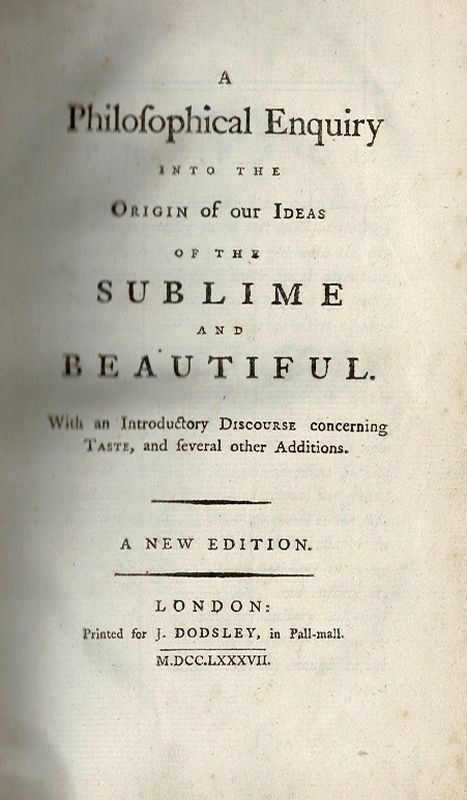[Burke, A Philosophical Enquiry into the Origin of Our Ideas of the Sublime and
A Philosophical Enquiry into the Origin of Our Ideas of the Sublime and Beautiful. With an Introductory Discourse concerning Taset, and several other Additions.
A New Edition. London, Printed for J.Dodsley, in Pall-mall, 1787. Octavo. IX, [7 unnumbered], 342 pages. Hardcover / Original, 18th century full leather with original, red spine-label. Gilt lettering and ornament on spine and boards. Spine cracked but still firm and holding. Very good condition with only minor signs of wear. Rare !
Edmund Burke (12 January 1729 – 9 July 1797) was an Anglo-Irish statesman and philosopher who spent most of his career in Great Britain. Born in Dublin, Burke served as a member of Parliament (MP) between 1766 and 1794 in the House of Commons of Great Britain with the Whig Party. His works shaped the political landscape of British conservative thought, and established the foundations for modern conservatism and liberal democracy. His writings also played an important role in influencing public views and opinions that followed the French Revolution of 1789, and as a result of his enduring importance in this area, he became widely regarded as the philosophical founder of Conservatism.
Burke was a proponent of underpinning virtues with manners in society and of the importance of religious institutions for the moral stability and good of the state. These views were expressed in his satirical work, A Vindication of Natural Society (1756). He also criticised the actions of the British government towards the American colonies, including its taxation policies. Burke supported the rights of the colonists to resist metropolitan authority, although he opposed the attempt to achieve independence. He is further remembered for his long-term support for Catholic emancipation, the impeachment of Warren Hastings from the East India Company, and his staunch opposition to the French Revolution.
In his Reflections on the Revolution in France (1790), Burke asserted that the revolution was destroying the fabric of good society and traditional institutions of state and society, and he condemned the persecution of the Catholic Church that resulted from it. This led to his becoming a popular leading figure within the conservative faction of the Whig Party which he dubbed the Old Whigs as opposed to the pro-French Revolution New Whigs led by Charles James Fox.
In the 19th century, Burke was praised by both conservatives and liberals. Subsequently, in the 20th century, he became widely regarded, especially in the United States and the United Kingdom, as the philosophical founder of conservatism, along with his ultra-royalist and ultramontane counterpart Joseph de Maistre.
Burke was born in Dublin, Ireland. His mother Mary, née Nagle, was a Roman Catholic who hailed from a County Cork family and a cousin of the Catholic educator Nano Nagle, whereas his father Richard, a successful solicitor, was a member of the Church of Ireland. It remains unclear whether this is the same Richard Burke who converted from Catholicism. The Burgh (Burke) dynasty descends from the Anglo-Norman knight, William de Burgh, who arrived in Ireland in 1185 following Henry II’s 1171 invasion of Ireland and is among the “chief Gall or Old English families that assimilated into Gaelic society” (the surname de Burgh (Latinised as de Burgo) was gaelicised in Irish as de Búrca or Búrc which over the centuries became Burke).
Burke adhered to his father’s faith and remained a practising Anglican throughout his life, unlike his sister Juliana, who was brought up as and remained a Roman Catholic. Later, his political enemies repeatedly accused him of having been educated at the Jesuit College of St. Omer, near Calais, France; and of harbouring secret Catholic sympathies at a time when membership in the Catholic Church would disqualify him from public office per Penal Laws in Ireland. As Burke told Frances Crewe:
Mr. Burke’s Enemies often endeavoured to convince the World that he had been bred up in the Catholic Faith, & that his Family were of it, & that he himself had been educated at St. Omer—but this was false, as his father was a regular practitioner of the Law at Dublin, which he could not be unless of the Established Church: & it so happened that though Mr. B was twice at Paris, he never happened to go through the Town of St. Omer.
After being elected to the House of Commons, Burke took the required oath of allegiance and abjuration, the oath of supremacy and the declaration against transubstantiation.
As a child, Burke sometimes spent time away from the unhealthy air of Dublin with his mother’s family near Killavullen in the Blackwater Valley in County Cork. He received his early education at a Quaker school in Ballitore, County Kildare, some 67 kilometres (42 mi) from Dublin; and possibly like his cousin Nano Nagle at a Hedge school near Killavullen. He remained in correspondence with his schoolmate from there, Mary Leadbeater, the daughter of the school’s owner, throughout his life.
In 1744, Burke started at Trinity College Dublin, a Protestant establishment which up until 1793 did not permit Catholics to take degrees. In 1747, he set up a debating society, Edmund Burke’s Club, which in 1770 merged with Trinity’s Historical Club to form the College Historical Society, the oldest undergraduate society in the world. The minutes of the meetings of Burke’s Club remain in the collection of the Historical Society. Burke graduated from Trinity in 1748. Burke’s father wanted him to read Law and with this in mind, he went to London in 1750, where he entered the Middle Temple, before soon giving up legal study to travel in Continental Europe. After eschewing the Law, he pursued a livelihood through writing. (Wikipedia)
- Keywords: 18th Century · 18th Century – Rare · Philosophy Rare
- Language: English
- Inventory Number: 31951AB
EUR 475,--
© 2026 Inanna Rare Books Ltd. | Powered by HESCOM-Software










